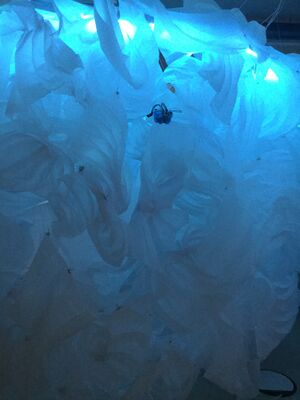User:LuziFerase/Papier Falten: Difference between revisions
LuziFerase (talk | contribs) No edit summary |
LuziFerase (talk | contribs) |
||
| (22 intermediate revisions by the same user not shown) | |||
| Line 1: | Line 1: | ||
'''Falten.Papier.''' |
|||
[[File:Papier.Falten..jpg|thumb]] |
[[File:Papier.Falten..jpg|thumb]] |
||
=Description= |
==Description== |
||
2019 we |
2019 we built a deambulatory shell consisting of 150 m2 paper, 16 pillow speakers, 1 bass speaker, 15,6 m Alu-H-Profile, 13,6 m LED-Strip, 1000 magnets, 300 foldback paper clips, 3 ultrasonic sensors, fishing line |
||
Around 105 million years ago the female paper boats* begin to make a fine shell that they hold on to with their arms. They leave caves and crevices behind them and head towards the water surface. To avoid attracting attention as flotsam, they have acquired camouflage: The thin membrane skin they stretch over their shells can change color. At times, the Argonauta females form chains and drift together through the sea. 180 years ago, seamstress and amateur naturalist Jeanne Villepreux-Power proves that the paper boats produce, hold and repair their own shell. |
Around 105 million years ago the female paper boats* begin to make a fine shell that they hold on to with their arms. They leave caves and crevices behind them and head towards the water surface. To avoid attracting attention as flotsam, they have acquired camouflage: The thin membrane skin they stretch over their shells can change color. At times, the Argonauta females form chains and drift together through the sea. 180 years ago, seamstress and amateur naturalist Jeanne Villepreux-Power proves that the paper boats produce, hold and repair their own shell. |
||
| ⚫ | |||
''Credits:'' |
|||
| ⚫ | |||
| ⚫ | |||
@ the exhibition Power Cage – Experimentalraum Aquarium im State Studio Berlin |
|||
| ⚫ | |||
A deambulatory structure of paper which is lit from the inside, getting darker the closer you get to it |
A deambulatory structure of paper which is lit from the inside, getting darker the closer you get to it |
||
==Physical Set Up== |
|||
A metal structure made of |
A metal structure made of aluminium H profiles hanging from the ceiling, used as a skeleton for the paper folds and as a cooling body for the LED strips |
||
Here you find [[Media:Papier.Falten._Planning.pdf | The Plan]] and [[Media:Papier.Falten Skizze.pdf | Drafts Of The Final Shape]] |
|||
Here you find Sketches and Plans : |
|||
==Guts== |
|||
===Hardware=== |
|||
ultrasonic sensors, Arduinos, a [[Raspberry Pi]] + [[BitWizard DMX Interface]] for light controlling, Raspberry Pi as Gateway. Once it´s up and running, it´s a stand alone system, in order to restart a laptop and router are needed |
|||
===Software=== |
|||
| ⚫ | |||
<span style="color:blue"> ''This Part is still under construction'' </span> |
|||
| ⚫ | |||
| ⚫ | |||
To Do: |
|||
Precisely describe the software installation…... |
|||
| ⚫ | |||
Latest revision as of 14:46, 15 April 2021
Description
2019 we built a deambulatory shell consisting of 150 m2 paper, 16 pillow speakers, 1 bass speaker, 15,6 m Alu-H-Profile, 13,6 m LED-Strip, 1000 magnets, 300 foldback paper clips, 3 ultrasonic sensors, fishing line
Around 105 million years ago the female paper boats* begin to make a fine shell that they hold on to with their arms. They leave caves and crevices behind them and head towards the water surface. To avoid attracting attention as flotsam, they have acquired camouflage: The thin membrane skin they stretch over their shells can change color. At times, the Argonauta females form chains and drift together through the sea. 180 years ago, seamstress and amateur naturalist Jeanne Villepreux-Power proves that the paper boats produce, hold and repair their own shell.
concept and realisation: Christina Ertl-Shirley und Ruth Waldeyer with Kim Scheunemann @ the exhibition Power Cage – Experimentalraum Aquarium im State Studio Berlin
Light Idea
A deambulatory structure of paper which is lit from the inside, getting darker the closer you get to it
Physical Set Up
A metal structure made of aluminium H profiles hanging from the ceiling, used as a skeleton for the paper folds and as a cooling body for the LED strips
Here you find The Plan and Drafts Of The Final Shape
Guts
Hardware
ultrasonic sensors, Arduinos, a Raspberry Pi + BitWizard DMX Interface for light controlling, Raspberry Pi as Gateway. Once it´s up and running, it´s a stand alone system, in order to restart a laptop and router are needed
Software
This Part is still under construction
